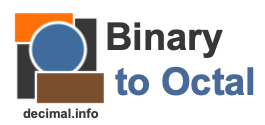
Here we will show you how to convert the binary number 1011001110111000 to an octal number. First note that the binary number system only has two different digits (0 & 1) and the octal number system has 8 different digits (0 1 2 3 4 5 6 7).
The four steps used to convert 1011001110111000 from binary to octal are explained below.
Step 1)
Multiply the last digit in 1011001110111000 by 2⁰, multiply the second to last digit in 1011001110111000 by 2¹, multiply the third to last digit in 1011001110111000 by 2², multiply the fourth to last digit in 1011001110111000 by 2³, and so on, until all the digits are used:
0 × 2⁰ = 0
0 × 2¹ = 0
0 × 2² = 0
1 × 2³ = 8
1 × 2⁴ = 16
1 × 2⁵ = 32
0 × 2⁶ = 0
1 × 2⁷ = 128
1 × 2⁸ = 256
1 × 2⁹ = 512
0 × 2¹⁰ = 0
0 × 2¹¹ = 0
1 × 2¹² = 4096
1 × 2¹³ = 8192
0 × 2¹⁴ = 0
1 × 2¹⁵ = 32768
Step 2)
Add up all the products we got from Step 1, like this:
0 + 0 + 0 + 8 + 16 + 32 + 0 + 128 + 256 + 512 + 0 + 0 + 4096 + 8192 + 0 + 32768 = 46008
Step 3)
Divide the sum from Step 2 by 8. Put the remainder aside. Then divide the whole part by 8 again, and put the remainder aside again. Keep doing this until the whole part is 0.
46008 ÷ 8 = 5751 with 0 remainder
5751 ÷ 8 = 718 with 7 remainder
718 ÷ 8 = 89 with 6 remainder
89 ÷ 8 = 11 with 1 remainder
11 ÷ 8 = 1 with 3 remainder
1 ÷ 8 = 0 with 1 remainder
Step 4)
Take the remainders from Step 3 and put them together in reverse order to get the answer to 1011001110111000 binary to octal:
1011001110111000 binary = 131670 octal
Binary to Octal Converter
Here you can convert another binary number to octal. Remember, binary numbers only include digits 0 and 1.
1011001110111001 binary to octal
Go here for the next binary number on our list that we have converted to octal.
Copyright | Privacy Policy | Disclaimer | Contact
